小学五年级英语知识点
小学五年级英语知识点归纳

小学五年级英语知识点归纳第一单元知识点一、关键词:domorningexercises晨练,做早操eatbreakfast吃早饭haveenglishclass上英语课eatdinner吃晚饭playsports进行体育活动eatlunch吃午饭climbmountains爬山goshopping购物,买东西playthepiano弹钢琴visitgrandparents看望(外)祖父母gohiking去远足二、主要句子:whendoyoueatdinner?你什么时候吃晚饭?晚上7点吃晚饭。
我晚上七点吃晚饭。
你什么时候起床?你什么时候起床?我通常在中午12点起床。
我通常中午12点起床。
你在周末干什么?你周末做什么?usuallyiwatchtvandgoshopping.我通常看电视和购物。
sometimesivisitmygrandparents.有时候我去看望我的外祖父母。
看足球。
我经常踢足球。
有时去远足。
有时我去远足。
3、同义词eatbreakfast―havebreakfast,eatlunch―havelunch,eatdinner―havedinner,playsports―dosports,u sually―often复数形式:policeman―policemenpolicewoman―policewomen现在分词:tell―telling第三人称单数:say―says你是做什么的?你是做什么的?四、表示频度的副词:always总是,一直;usually通常,常常;often经常;sometimes有时候五、以复数形式出现的词组:visitgrandparentsplanttrees六、当一个介词后面跟一个表示时间的词时,它的意思是在某一年、月、季节和时间(上午、下午和晚上);在一周中的某一天以及特定的时间和分钟七、too和either的用法区别:too和either都是“也”的意思,但too用于肯定句,either用于否定句。
五年级英语知识点总结
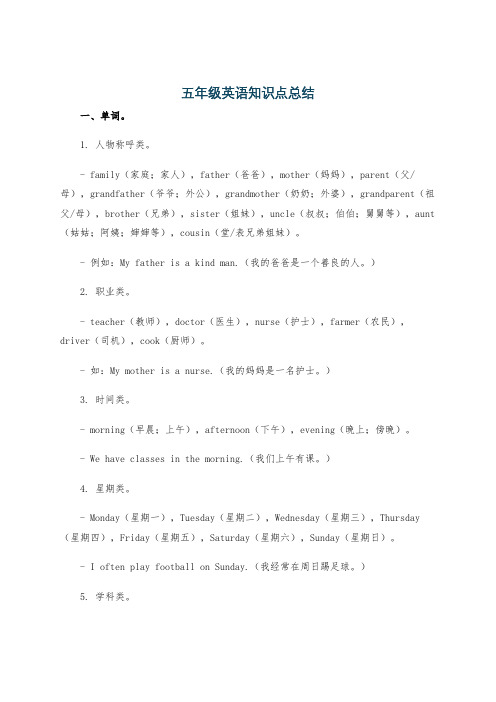
五年级英语知识点总结一、单词。
1. 人物称呼类。
- family(家庭;家人),father(爸爸),mother(妈妈),parent(父/母),grandfather(爷爷;外公),grandmother(奶奶;外婆),grandparent(祖父/母),brother(兄弟),sister(姐妹),uncle(叔叔;伯伯;舅舅等),aunt (姑姑;阿姨;婶婶等),cousin(堂/表兄弟姐妹)。
- 例如:My father is a kind man.(我的爸爸是一个善良的人。
)2. 职业类。
- teacher(教师),doctor(医生),nurse(护士),farmer(农民),driver(司机),cook(厨师)。
- 如:My mother is a nurse.(我的妈妈是一名护士。
)3. 时间类。
- morning(早晨;上午),afternoon(下午),evening(晚上;傍晚)。
- We have classes in the morning.(我们上午有课。
)4. 星期类。
- Monday(星期一),Tuesday(星期二),Wednesday(星期三),Thursday (星期四),Friday(星期五),Saturday(星期六),Sunday(星期日)。
- I often play football on Sunday.(我经常在周日踢足球。
)5. 学科类。
- Chinese(语文),English(英语),maths(数学),science(科学),music(音乐),art(美术),PE(体育)。
- My favourite subject is English.(我最喜欢的学科是英语。
)6. 形容词类。
- young(年轻的),old(年老的;旧的),funny(滑稽的;可笑的),kind (和蔼的;亲切的),strict(严格的)。
- Our English teacher is very kind.(我们的英语老师非常和蔼。
小学五年级英语知识点归纳总结
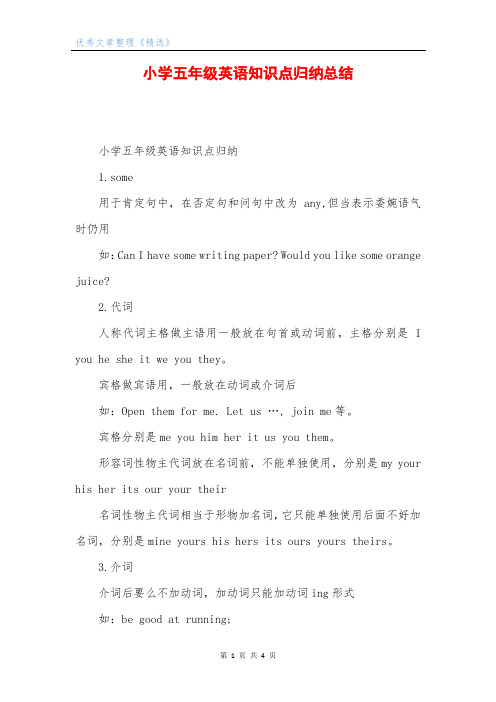
小学五年级英语知识点归纳总结小学五年级英语知识点归纳1.some用于肯定句中,在否定句和问句中改为any,但当表示委婉语气时仍用如:Can I have some writing paper? Would you like some orange juice?2.代词人称代词主格做主语用一般放在句首或动词前,主格分别是 I you he she it we you they。
宾格做宾语用,一般放在动词或介词后如:Open them for me. Let us …, join me等。
宾格分别是me you him her it us you them。
形容词性物主代词放在名词前,不能单独使用,分别是my your his her its our your their名词性物主代词相当于形物加名词,它只能单独使用后面不好加名词,分别是mine yours his hers its ours yours theirs。
3.介词介词后要么不加动词,加动词只能加动词ing形式如:be good at running;第1页共4页do well in jumping;4.时间介词季节前,月份前用介词in如:in summer;in March具体的哪一天如星期几,几月几日用介词on如:on Saturday; on the second of April; on Wednesday morning在几点钟前用介词at如:at a quarter to four;只在上下午晚上用in如:in the morning/ afternoon/ evening;但在夜间用at night。
另:季节,月份和星期前不好加the.5.名词复数构成的(方法)有规则的有:(1)直接在名词后加s如orange—oranges; photo—photos;(2) 以x, s, sh, ch 结尾的加es如:box—boxes; glass—glasses; waitress—waitresses; watch—watches;peach--peaches(3) 以辅音字母加y结尾的改y为i加es如:study—studies;library—libraries; hobby—hobbies;family—families;(4)以f, fe结尾的改f, fe 为v+es如:knife—knives; thief —thieves(注:以o结尾的我们学过的只有mango加es, mango—mangoes其余加s,)不规则的有:man—men; woman—women; people—people; child—children 6.动词第三人称单数的构成(1)直接在动词后加s如:run—runs; dance—dances(2)以s,sh,ch,o结尾的加es如:do—does;go—goes;wash—washes;catch—catches(3)以辅音字母加y结尾的改y为i加es如:study—studies; carry—carries;小学五年级英语知识点(总结)人称代词、名词所有格及序数词1、主格用来作句中的主语,用于动词前面。
五年级上册英语知识点总结
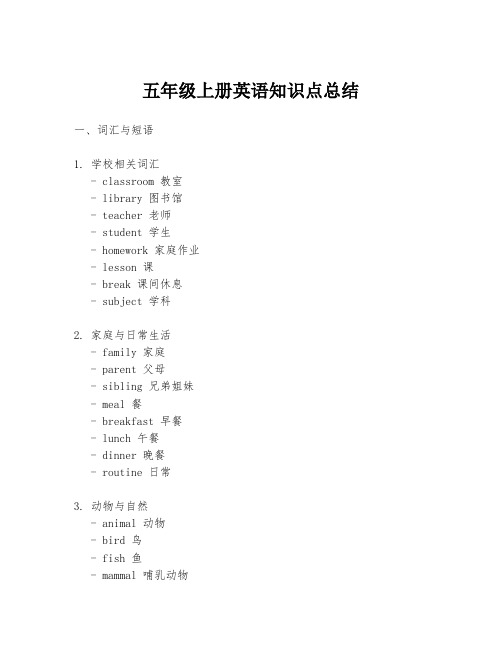
五年级上册英语知识点总结一、词汇与短语1. 学校相关词汇- classroom 教室- library 图书馆- teacher 老师- student 学生- homework 家庭作业- lesson 课- break 课间休息- subject 学科2. 家庭与日常生活- family 家庭- parent 父母- sibling 兄弟姐妹- meal 餐- breakfast 早餐- lunch 午餐- dinner 晚餐- routine 日常3. 动物与自然- animal 动物- bird 鸟- fish 鱼- mammal 哺乳动物- reptile 爬行动物 - insect 昆虫- forest 森林- river 河流4. 食物与饮料- fruit 水果- vegetable 蔬菜- meat 肉类- snack 小吃- dessert 甜点- beverage 饮料- water 水- milk 牛奶5. 交通与旅行- car 汽车- bus 公共汽车- train 火车- plane 飞机- travel 旅行- destination 目的地 - map 地图- hotel 酒店6. 职业与工作- job 工作- doctor 医生- nurse 护士- teacher 老师- engineer 工程师- farmer 农民- worker 工人二、语法1. 一般现在时- 描述习惯性动作或状态- 例句:I usually get up at 6:30.2. 一般过去时- 描述过去发生的动作或状态- 例句:We visited the museum last Saturday.3. 一般将来时- 描述将来的动作或计划- 例句:They will go on a trip next month.4. 现在进行时- 描述正在进行的动作- 例句:She is reading a book right now.5. 可数名词与不可数名词- 可数名词:可以用数字计数的名词,如 apples, books- 不可数名词:不能用数字计数的名词,如水 water, information6. 代词- 主格代词:I, you, he, she, it, we, they- 宾格代词:me, you, him, her, it, us, them- 形容词性物主代词:my, your, his, her, its, our, their - 名词性物主代词:mine, yours, his, hers, its, ours,theirs7. 形容词与副词- 形容词:描述事物的特征或性质,如 big, small, happy- 副词:描述动作的方式、地点、时间等,如 quickly, happily, here8. 情态动词- can, could, may, might, must, should, will, would三、句型结构1. 简单句- 基本句型:主语 + 谓语 + 宾语- 例句:The cat sleeps on the mat.2. 并列句- 使用并列连词连接两个或多个简单句- 例句:I like apples, but I don't like oranges.3. 复合句- 包含主句和从句的句子- 例句:When it rains, I usually take an umbrella.4. 问句- 使用疑问词提问- 例句:What time is it? / Where are you going?四、阅读理解与写作技巧1. 阅读理解- 学习通过上下文推断生词的意思- 练习总结文章的主旨大意- 练习寻找文章中的细节信息2. 写作技巧- 学习如何写日记、信件和简短的故事- 练习使用恰当的时态描述不同的事件- 练习组织段落,使用主题句和支持句五、听力与口语1. 听力- 练习听懂日常对话和简短的叙述- 学习如何从听力材料中提取关键信息2. 口语- 练习日常交流,如自我介绍、购物、问路 - 学习如何使用正确的语音和语调- 练习参与小组讨论和角色扮演六、文化知识1. 了解英语国家的节日和习俗2. 学习英语国家的历史和。
五年级英语知识点总结

五年级英语知识点总结一、词汇积累1. 基础词汇- 学校科目:Math(数学)、Science(科学)、History(历史)、Art(艺术)- 常见动物:Dog(狗)、Cat(猫)、Bird(鸟)、Fish(鱼)- 家庭成员:Mother(母亲)、Father(父亲)、Sister(姐妹)、Brother(兄弟)- 职业:Teacher(教师)、Doctor(医生)、Nurse(护士)、Policeman(警察)- 常见颜色:Red(红色)、Blue(蓝色)、Green(绿色)、Yellow(黄色)- 常见食物:Apple(苹果)、Banana(香蕉)、Chicken(鸡肉)、Rice(米饭)2. 扩展词汇- 学校活动:Reading Club(阅读俱乐部)、Sports Day(运动会) - 节假日:Christmas(圣诞节)、New Year's Day(元旦)- 自然现象:Rain(雨)、Snow(雪)、Thunderstorm(雷暴)- 交通工具:Bicycle(自行车)、Bus(公共汽车)、Train(火车)- 学校设施:Library(图书馆)、Gym(体育馆)、Cafeteria(食堂)二、语法要点1. 时态- 一般现在时:表示经常发生的动作或状态,如:I go to school every day.- 一般过去时:表示过去发生的动作或状态,如:He visited his grandparents last week.- 一般将来时:表示将来发生的动作或状态,如:They will go on a trip next month.2. 代词- 人称代词:I(我)、You(你)、He(他)、She(她)、It (它)、We(我们)、They(他们)- 物主代词:My(我的)、Your(你的)、His(他的)、Her(她的)、Its(它的)、Our(我们的)、Their(他们的)3. 句型结构- 肯定句:The sun rises in the east.- 否定句:The sun does not rise in the west.- 疑问句:Does the sun rise in the east? / The sun doesnot rise in the west, does it?4. 简单句和并列句- 简单句:She reads a book.(她读一本书。
五年级英语知识点梳理

一、语法知识点1.时态:一般现在时、一般过去时、一般将来时、现在进行时、过去进行时、将来进行时2.人称代词:主格、宾格、物主代词3.形容词比较级和最高级4.数词和序数词的用法5. 不定代词:some, any, no, each, every等6.疑问句的构成和回答7.可数名词和不可数名词的用法8. 情态动词:can, could, may, might, should, ought to二、词汇知识点1.常见的动词、名词、形容词和副词2.介词的用法3. 指示代词:this, that, these, those4. 时间词:days of the week, months, seasons等5.衣物、食物、家具和动物等的名称6.数字和计量单位的表达7.季节、天气、国家、城市和家庭成员的表达三、听力和口语技巧1.听力训练:听音辨词、听音选图、听音答题等2.口语练习:对话练习、角色扮演、口头作文等3.培养听力和口语的技巧:注意听力材料的重点,提高听力速度,培养正确的发音和语调等四、阅读和写作技巧1.阅读练习:理解短文的主旨和细节、找出关键词、填空等2.写作训练:书写字母、单词拼写、构造句子、写作短文等3.培养阅读和写作的技巧:阅读时注意朗读、理解词汇和句子的意思,写作时注意语法、拼写和逻辑连贯性等五、其他知识点1.四会单词:熟练掌握五年级单元中的重点单词2.句型转换:正确进行句型转换,如肯定句、否定句、一般疑问句等3.听力材料的听写:通过听写提高听力和拼写能力4.句子的改写和补充:根据给定的句子添加适当的词语或短语总结起来,五年级英语的知识点主要包括语法、词汇、听力、口语、阅读和写作等方面的学习。
通过掌握这些知识点,学生能够提高英语水平,更好地进行听说读写的综合能力训练。
小学五年级英语知识点六篇
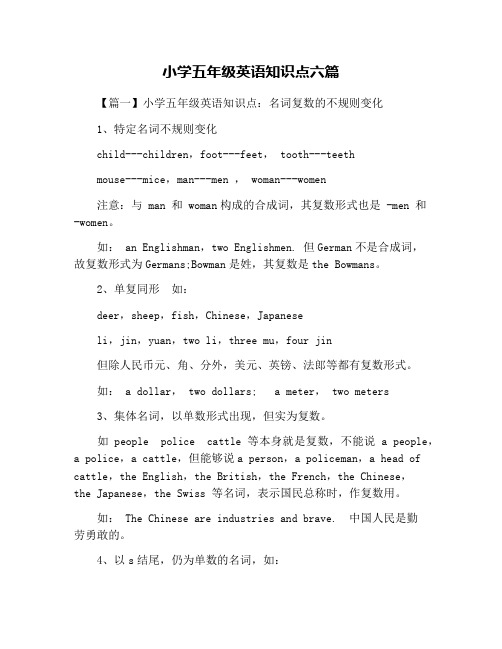
小学五年级英语知识点六篇【篇一】小学五年级英语知识点:名词复数的不规则变化1、特定名词不规则变化child---children,foot---feet, tooth---teethmouse---mice,man---men , woman---women注意:与 man 和 woman构成的合成词,其复数形式也是 -men 和-women。
如: an Englishman,two Englishmen. 但German不是合成词,故复数形式为Germans;Bowman是姓,其复数是the Bowmans。
2、单复同形如:deer,sheep,fish,Chinese,Japaneseli,jin,yuan,two li,three mu,four jin但除人民币元、角、分外,美元、英镑、法郎等都有复数形式。
如: a dollar, two dollars; a meter, two meters3、集体名词,以单数形式出现,但实为复数。
如people police cattle 等本身就是复数,不能说 a people,a police,a cattle,但能够说a person,a policeman,a head of cattle,the English,the British,the French,the Chinese,the Japanese,the Swiss 等名词,表示国民总称时,作复数用。
如: The Chinese are industries and brave. 中国人民是勤劳勇敢的。
4、以s结尾,仍为单数的名词,如:a. maths,politics,physics等学科名词,为不可数名词,是单数。
b. news 是不可数名词。
c. the United States,the United Nations 应视为单数。
如:The United Nations was organized in 1945. 联合国是1945年组建起来的。
小学五年级英语知识点归纳
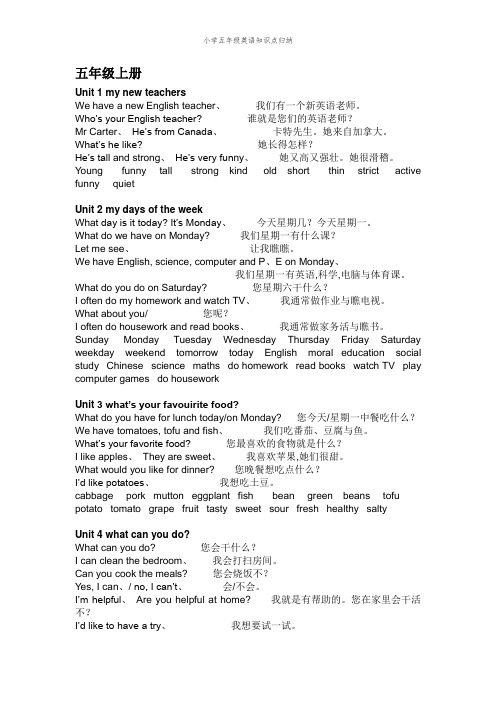
五年级上册Unit 1 my new teachersWe have a new English teacher、我们有一个新英语老师。
Who’s your English teacher?谁就是您们的英语老师?Mr Carter、He’s from Canada、卡特先生。
她来自加拿大。
What’s he like?她长得怎样?He’s ta ll and strong、He’s very fun ny、她又高又强壮。
她很滑稽。
Young funny tall strong kind old short thin strict active funny quietUnit 2 my days of the weekWha t day is it today? It’s Monday、今天星期几?今天星期一。
What do we have on Monday? 我们星期一有什么课?Let me see、让我瞧瞧。
We have English, science, computer and P、E on Monday、我们星期一有英语,科学,电脑与体育课。
What do you do on Saturday? 您星期六干什么?I often do my homework and watch TV、我通常做作业与瞧电视。
What about you/ 您呢?I often do housework and read books、我通常做家务活与瞧书。
Sunday Monday Tuesday Wednesday Thursday Friday Saturday weekday weekend tomorrow today English moral education social study Chinese science maths do homework read books watch TV play computer games do houseworkUnit 3 what’s your favouirite food?What do you have for lunch today/on Monday? 您今天/星期一中餐吃什么?We have tomatoes, tofu and fish、我们吃番茄、豆腐与鱼。
人教版五年级英语知识点总结

Unit 1 What's he like?1.重点词汇外貌特征:old 年老的;young 年青的,年幼的;tall 高的;short 矮的thin 瘦的;strong 强壮的;性格特点:funny 滑稽可笑的;kind和蔼的亲切的;strict严格的;smart聪明的(常用来形容女孩子);active积极活跃的;quiet安静文静的;其他:缩写:what's=what is ; who's = who is;he's = he is; she's =she isMiss 女士\ Mr. 先生Very非常2.重点句型(1)询问人---- Who's your math teacher?----- Miss Hu. 你们的数学老师是谁?是胡老师。
---- Who's that woman? ---- She is my mother. 那个妇女是谁?她是我妈妈。
(2)询问人的外貌特征---- What's he like? ---- He's tall and strong. 他长什么样?他又高又壮。
---- Is she very old? ---- No, she is very young. 她很老吗?不,她很年轻。
---- Is he very short? ---- No, he isn't. He's very tall. 他很矮吗?不,他很高。
(3)询问人的性格特点---- Is she very quiet? ---- No, she isn't. She's very active. 她很安静吗?不,她很活跃。
---- Is she very strict? ---- Yes, she is, but she's very kind. 她很严格吗?是的,但是她很和蔼。
小学五年级英语知识点(3篇)

【导语】知识点是知识、理论、道理、思想等的相对独⽴的最⼩单元。
以下是整理的《⼩学五年级英语知识点(3篇)》相关资料,希望帮助到您。
【篇⼀】⼩学五年级英语知识点 ⼀、主要单词: do morning exercises 晨练,做早操 eat breakfast吃早饭 have English class上英语课 play sports进⾏体育活动 eat dinner吃晚饭 eat lunch吃午饭 climb mountains 爬⼭ go shopping购物,买东西 play the piano 弹钢琴 visit grandparents 看望(外)祖⽗母 go hiking去远⾜ ⼆、主要句⼦: When do you eat dinner?你什么时候吃晚饭? I eat dinner at 7:00 in the evening. 我晚上七点吃晚饭。
When do you get up? 你什么时候起床? I usually get up at 12:00 at noon.我通常在中午12点起床。
What do you do on the weekend?你在周末⼲什么? Usually I watch TV and go shopping. 我通常看电视和购物。
Sometimes I visit my grandparents.有时候我去看望我的外祖⽗母。
I often play football. 我经常踢⾜球。
Sometimes I go hiking.有时候我去远⾜。
三、同义词 eat breakfast—have breakfast eat lunch—have lunch eat dinner—have dinner play sports—do sports usually—often 复数形式:policeman—policemen policewoman—policewomen 现在分词:tell—telling 三单:say—says 同义句:What do you do ? ---What are you? 你是⼲什么的? 四、表⽰频度的副词:always 总是,⼀直 usually 通常,常常 often 经常 sometimes 有时候 五、以复数形式出现的词组:visit grandparents plant trees 六、介词后跟表⽰时间的词语时,表⽰在某年、某⽉、某个季节,某个时候(在上午,在下午,在晚上)⽤in;表⽰在某⼀天,在星期⼏⽤on,在具体的⼏点⼏分⽤at. 七、too 和either的⽤法区别:too和either都是“也”的意思,但too⽤于肯定句,either⽤于否定句。
小学英语五年级第一学期全册知识点复习整理归纳
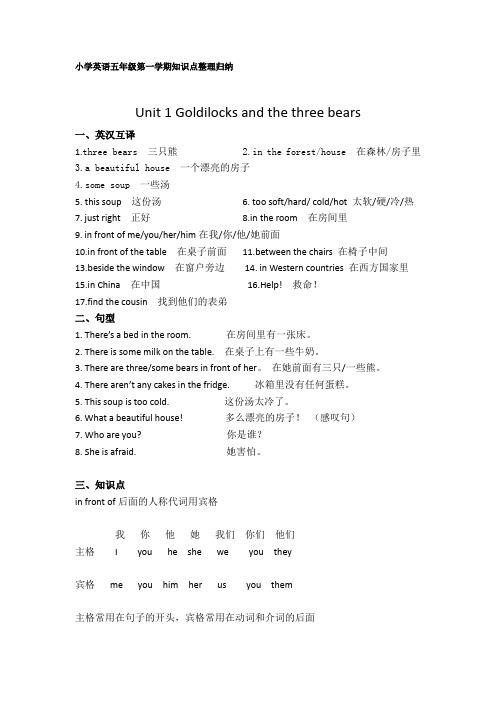
小学英语五年级第一学期知识点整理归纳Unit 1 Goldilocks and the three bears一、英汉互译1.three bears 三只熊2.in the forest/house 在森林/房子里3.a beautiful house 一个漂亮的房子4.some soup 一些汤5. this soup 这份汤6. too soft/hard/ cold/hot 太软/硬/冷/热7.just right 正好8.in the room 在房间里9.in front of me/you/her/him在我/你/他/她前面10.in front of the table 在桌子前面11.between the chairs 在椅子中间13.beside the window 在窗户旁边14.in Western countries 在西方国家里15.in China 在中国16.Help! 救命!17.find the cousin 找到他们的表弟二、句型1. There’s a bed in the room. 在房间里有一张床。
2. There is some milk on the table. 在桌子上有一些牛奶。
3. There are three/some bears in front of her。
在她前面有三只/一些熊。
4. There aren’t any cakes in the fridge. 冰箱里没有任何蛋糕。
5. This soup is too cold. 这份汤太冷了。
6.What a beautiful house! 多么漂亮的房子!(感叹句)7. Who are you? 你是谁?8. She is afraid. 她害怕。
三、知识点in front of后面的人称代词用宾格我你他她我们你们他们主格I you he she we you they宾格me you him her us you them主格常用在句子的开头,宾格常用在动词和介词的后面Unit 2 A new student一、英汉互译1.a new student一名新学生3.the first/second/third floor第一层/第二层/第三层4.on the first/second/third floor在第一层/第二层/第三层5.in our school 在我们学校6.in the playground 在操场上7.on the swing 在秋千上8.push me 推我9.too high 太高 10.go and play 去玩11.our classroom 我们的教室12.go and have a look 去看一看13.so heavy 这么重14.Stop!停下!二、句型1.--- Is there a music room?有一间音乐室吗?--- Yes, there is./ No, there isn’t. 是的,有。
小学五年级英语语法知识点总结归纳

小学五年级英语语法知识点总结归纳一、基础词汇在小学五年级,学生开始接触更丰富的词汇,包括更复杂的名词、动词、形容词、副词等。
这些词汇的学习是构建语言能力的基石。
举例:名词:computer(电脑)、internet(互联网)、mobile phone (手机)动词:research(研究)、download(下载)、upload(上传)形容词:smart(聪明的)、fast(快的)、cool(酷的)副词:quickly(迅速地)、slowly(缓慢地)、really(真正地)二、基础句型学生需要继续巩固和拓展四种基本句型,并学习更复杂的句子结构,如并列句和复合句。
举例:主语+谓语:She sings.(她唱歌。
)主语+谓语+宾语:I like apples.(我喜欢苹果。
)主语+谓语+宾语+宾语补足语:We elected him our monitor.(我们选他为班长。
)并列句:She sings beautifully, and she dances gracefully.(她唱得优美,舞跳得优雅。
)复合句:I know the man who lives next door.(我认识住在隔壁的那个人。
)三、时态在小学五年级,学生开始学习一般过去时和现在进行时,并开始接触一般将来时的基本概念。
举例:一般过去时:Yesterday, I went to the park.(昨天我去了公园。
)现在进行时:She is studying now.(她现在正在学习。
)一般将来时(简单形式):I will go to the zoo tomorrow.(我明天将去动物园。
)四、动词的形式学生需要继续学习动词的第三人称单数形式、现在分词、过去式和过去分词,并开始了解情态动词的用法。
举例:第三人称单数形式:He studies hard.(他努力学习。
)现在分词:She is dancing.(她正在跳舞。
小学五年级英语语法知识点总结大全
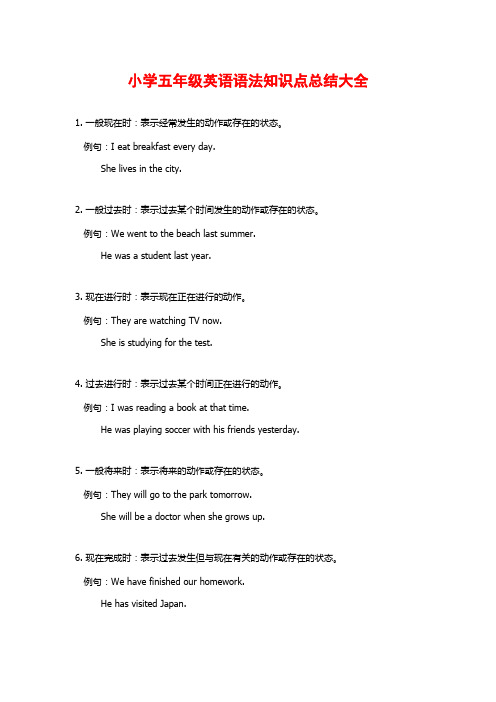
小学五年级英语语法知识点总结大全1. 一般现在时:表示经常发生的动作或存在的状态。
例句:I eat breakfast every day.She lives in the city.2. 一般过去时:表示过去某个时间发生的动作或存在的状态。
例句:We went to the beach last summer.He was a student last year.3. 现在进行时:表示现在正在进行的动作。
例句:They are watching TV now.She is studying for the test.4. 过去进行时:表示过去某个时间正在进行的动作。
例句:I was reading a book at that time.He was playing soccer with his friends yesterday.5. 一般将来时:表示将来的动作或存在的状态。
例句:They will go to the park tomorrow.She will be a doctor when she grows up.6. 现在完成时:表示过去发生但与现在有关的动作或存在的状态。
例句:We have finished our homework.He has visited Japan.7. 过去完成时:表示过去某个时间之前已经发生的动作。
例句:I had already eaten dinner when they arrived.She had studied for the test before she took it.8. 一般将来时:表示将来某个时间将要发生的动作或存在的状态。
例句:We will be having a party next week.They will be traveling around the world.9. 一般将来时:表示将来某个时间将要发生的动作或存在的状态。
五年级英语口语必备知识点
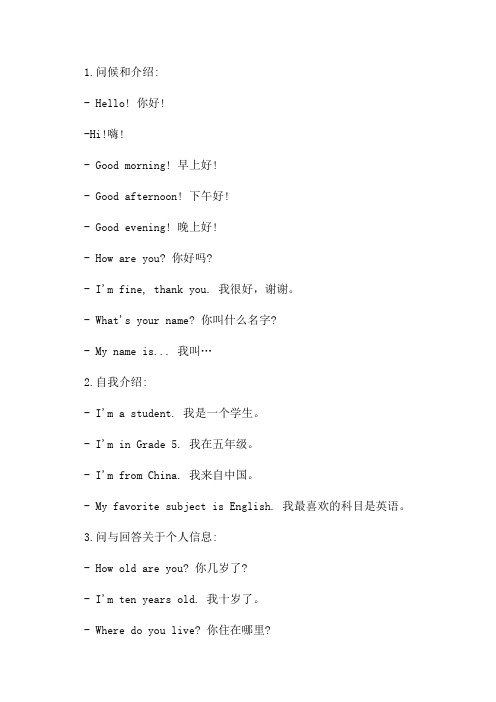
1.问候和介绍:- Hello! 你好!-Hi!嗨!- Good morning! 早上好!- Good afternoon! 下午好!- Good evening! 晚上好!- How are you? 你好吗?- I'm fine, thank you. 我很好,谢谢。
- What's your name? 你叫什么名字?- My name is... 我叫…2.自我介绍:- I'm a student. 我是一个学生。
- I'm in Grade 5. 我在五年级。
- I'm from China. 我来自中国。
- My favorite subject is English. 我最喜欢的科目是英语。
3.问与回答关于个人信息:- How old are you? 你几岁了?- I'm ten years old. 我十岁了。
- Where do you live? 你住在哪里?- I live in Beijing. 我住在北京。
- Do you have any siblings? 你有兄弟姐妹吗?- Yes, I have one brother. 是的,我有一个哥哥。
- What's your favorite color? 你最喜欢的颜色是什么?- My favorite color is blue. 我最喜欢的颜色是蓝色。
4.问与回答关于学校:- What's your school's name? 你的学校叫什么名字?- My school's name is... 我的学校叫…- What grade are you in? 你在几年级?- I'm in Grade 5. 我在五年级。
- How do you go to school? 你怎么去学校?- I go to school by bus. 我坐公交车去学校。
人教版五年级英语知识点总结
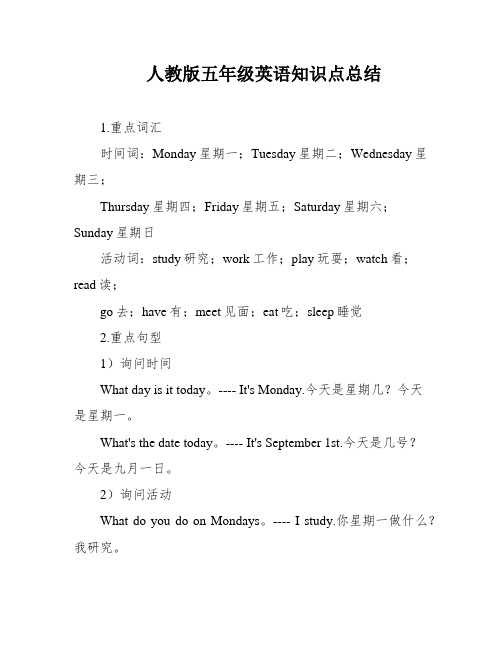
人教版五年级英语知识点总结1.重点词汇时间词:Monday星期一;Tuesday星期二;Wednesday星期三;Thursday星期四;Friday星期五;Saturday星期六;Sunday星期日活动词:study研究;work工作;play玩耍;watch看;read读;go去;have有;meet见面;eat吃;sleep睡觉2.重点句型1)询问时间What day is it today。
---- It's Monday.今天是星期几?今天是星期一。
What's the date today。
---- It's September 1st.今天是几号?今天是九月一日。
2)询问活动What do you do on Mondays。
---- I study.你星期一做什么?我研究。
What does your father do on weekends。
---- He works.你爸爸周末做什么?他工作。
3)描述一周活动安排On Mondays。
I study at school。
On Tuesdays。
I play XXX Wednesdays。
I watch a movie at home。
On Thursdays。
XXX Fridays。
I eat pizza for dinner。
On Saturdays。
I go shoppingwith my mom。
On Sundays。
I sleep in and relax at home.3.n字母组合:XXXXXXXXXXXXXXX。
XXX。
My phone has a fish wallpaper.This article is a guide to learning days of the week and subjects in Chinese schools。
The days of the week are Monday。
小学五年级英语重要的知识点归纳
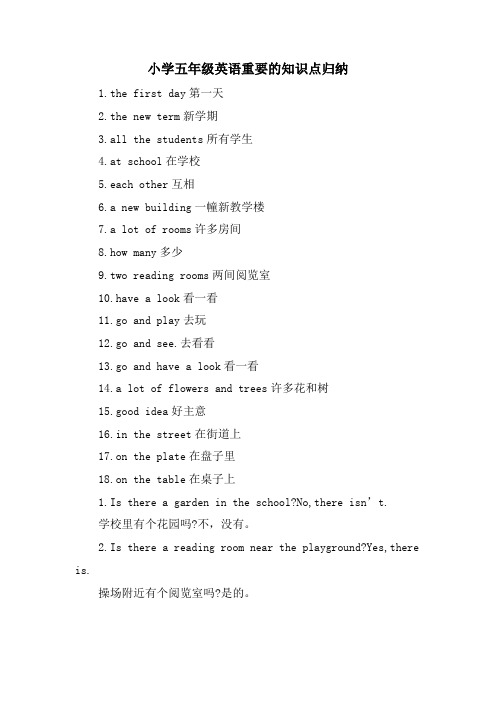
小学五年级英语重要的知识点归纳1.the first day第一天2.the new term新学期3.all the students所有学生4.at school在学校5.each other互相6.a new building一幢新教学楼7.a lot of rooms许多房间8.how many多少9.two reading rooms两间阅览室10.have a look看一看11.go and play去玩12.go and see.去看看13.go and have a look看一看14.a lot of flowers and trees许多花和树15.good idea好主意16.in the street在街道上17.on the plate在盘子里18.on the table在桌子上1.Is there a garden in the school?No,there isn’t.学校里有个花园吗?不,没有。
2.Is there a reading room near the playground?Yes,there is.操场附近有个阅览室吗?是的。
3.Are there any bookcases near the window?No,there aren’t.窗子附近有一些书橱吗?不,没有。
4.Are there any pictures on the desk?Yes,there are.课桌上有一些图片吗?是的。
5.How many TV rooms are there in the building?There are four.大楼里有几间电视房?有四间。
6.I’m not sure.我不能确定。
五年级英语语法知识点总结
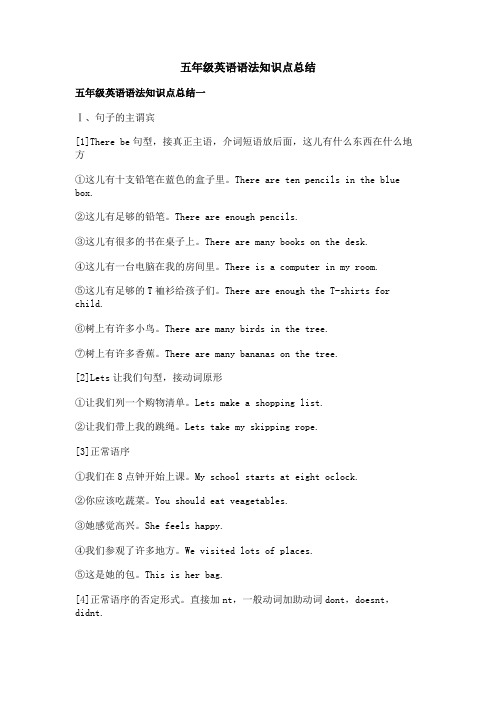
五年级英语语法知识点总结五年级英语语法知识点总结一Ⅰ、句子的主谓宾[1]There be句型,接真正主语,介词短语放后面,这儿有什么东西在什么地方①这儿有十支铅笔在蓝色的盒子里。
There are ten pencils in the blue box.②这儿有足够的铅笔。
There are enough pencils.③这儿有很多的书在桌子上。
There are many books on the desk.④这儿有一台电脑在我的房间里。
There is a computer in my room.⑤这儿有足够的T裇衫给孩子们。
There are enough the T-shirts for child.⑥树上有许多小鸟。
There are many birds in the tree.⑦树上有许多香蕉。
There are many bananas on the tree.[2]Lets让我们句型,接动词原形①让我们列一个购物清单。
Lets make a shopping list.②让我们带上我的跳绳。
Lets take my skipping rope.[3]正常语序①我们在8点钟开始上课。
My school starts at eight oclock.②你应该吃蔬菜。
You should eat veagetables.③她感觉高兴。
She feels happy.④我们参观了许多地方。
We visited lots of places.⑤这是她的包。
This is her bag.[4]正常语序的否定形式。
直接加nt,一般动词加助动词dont,doesnt,didnt.①昨天我没有骑自行车。
I didnt ride a bike yesterday.②这个老人没有坐下。
This old man don‘t sit down.③我们不应该在教室里下棋。
We shouldnt play chess in the class.④我根本不能做2。
五年级英语同步知识点总结

五年级英语同步知识点总结一、单词:young new kind tall long fatold (年老的) old(旧的) strict short(矮的) short(短的) thinfunny polite hard-working helpful clevershy quiet_______nice friendly_______ strong________ know_______ will______ so metimes_______ speak________ speak Chinese speak English finish_______ finish homework______________ Miss年轻女士,小姐(未婚)Ms女士(不明婚否) Mrs夫人(已婚)先生二、句型1、Who’s your art teacher? Mr Jones. 谁是你的美术老师。
琼斯先生。
2、Is he/she young? Yes,he/she is. No,he/she isn’t.他/她很年轻吗?是的,他/她很年轻。
不,他/她不年轻。
3、What’s Wu Yifan like? He’s hard-working. 吴一凡人怎么样?他勤奋努力。
4、I am helpful . He/She/It is clever. You/We/They are kind.Be动词用法口诀:我(I)用am,你(you)用are,is连着他(he)她(she)它(it),单数名词用is,复数名词都用are.Unit2单词:星期一星期二星期三星期四星期五星期六星期日周末在周日在周末洗看做,干看,读洗我的衣服看电视做作业看书踢,玩体育运动画画__________ 听音乐 _________ 踢足球做体育运动整理我的房间 ___________ 烹饪,烹调(名词)动词时常,经常每一个,每个应该,应当疲倦的一天,一日工作计划,日程安排句型:1、What do you have on Mondays? 星期一你有什么课?注意:(Monday加s表示每个周一)I have maths,English and music. 我有数学、英语和音乐课。
- 1、下载文档前请自行甄别文档内容的完整性,平台不提供额外的编辑、内容补充、找答案等附加服务。
- 2、"仅部分预览"的文档,不可在线预览部分如存在完整性等问题,可反馈申请退款(可完整预览的文档不适用该条件!)。
- 3、如文档侵犯您的权益,请联系客服反馈,我们会尽快为您处理(人工客服工作时间:9:00-18:30)。
第一单元四会单词:young年轻的funny滑稽可笑的 tall高的 strong强壮的 kind和蔼的old年老的 short矮的 thin瘦的 Mr先生 like像;喜欢 strict严格的 smart聪明的;巧妙的 active积极的;活跃的quiet安静的;文静的very很;非常but但是缩写形式:who’s=who is what’s=what is he’s=he is she’s=she is重要句型:1.Who’s your art teacher?你们的美术老师是谁?----Mr Hu.胡先生.2.What’s he like?他长得什么样子? ----He’s short and thin.他又矮又瘦3.Is she young?她年轻吗?----Yes,she is/No, she isn’t.以前的知识:I have a new math teacher.我有一个新数学老师.(小学三年级已经学过I have a pen.)注意: 划线部分可以替换.第二单元四会单词:Monday星期一 Tuesday星期二 Wednesday星期三Thursday星期四Friday星期五Saturday星期六Sunday星期日day天;日子have有;吃 on 在……时候 too也;太短语:do homework做作业 watch TV看电视 read books读书 What about?......怎么样?do housework做家务 play computer games玩电脑游戏重点句型:1.What day is it today?今天星期几?—It’s M onday.星期一.2.What do we have on Mondays?星期一我们有什么课?—We have English,science,computer and P.E.我们有英语课,科学,计算机跟体育课.3.What do you do on Saturdays?星期六你干什么?(具体的某一天前用介词on,在具体的时间前,用介词at)—I often do my homework.我通常做家庭作业.4.What about you?你呢?—I do my homework,too.我也是做家庭作业.第三单元四会单词:eggplant茄子 fish鱼green beans青豆tofu豆腐potato土豆tomato 西红柿for为;给lunch中餐;午饭we我们tasty好吃的;可口的sweet甜的sour 酸的fresh新鲜的salty咸的favourite最喜爱的;特别喜爱的fruit水果grape 葡萄缩写形式:they’re=they are don’t=do not重点句型:1.What would you like for lunch?你午餐想吃什么?-----I’d like some tomatoes and mutton.我想吃一些西红柿跟羊肉.2.What’s your favourite fruit?你最喜欢的水果是什么?------/I like apples.我喜欢苹果.3.I don’t like grapes.我不喜欢葡萄.4.Bananas are my favourite.我最喜欢香蕉.第四单元一. 单词:empty the trash倒垃圾cook the meals 做饭water the flowers浇花sweep the floor扫地clean the bedroom打扫卧室make the bed铺床set the table摆餐具wash the clothes洗衣服do the dishes洗碗碟put away the clothes收拾衣服can’t = cannot(不会;不能)use a computer(使用计算机)二. 句子:1. I’m he lpful! I can sweep the floor。
我是有用的!我能扫地。
2. Are you helpful at home?你在家有用吗?------Sure. 当然。
3. What can you do ? 你会干什么?------I can sweep the floor.我会扫地。
4. Can you do housework? 你能会家务吗?------Yes I can.是的,我会No, I can't,(but I’d like to have a try.)不,我不会,但我想试一试.(括号内的句子可以省略)三. 语法:1、当你想询问别人会干什么时,用What can you do? 答句I can后面加自己会做的事.当你想知道他人会干什么时,可用What can he do ? 或者What can she do ? 答语是He can......或者是She can......2、I can …变为一般疑问句:Can you …?He can…或She can …变为一般疑问句:Can he …/ Can she …? 其中的he , she 也可以变为其他具体的人物。
如 My mother can cook the meals. 变为一般疑问句:Can your mother cook the meals? 答语有两种:肯定回答Yes,she can.否定回答:No,she can’t.3、help (形容词形式)――helpful helpful (动词形式)――help4、当句子中出现了情态动词can或其否定形式can’t时,其他的动词要用原形。
第五单元一.单词:air-conditioner空调curtain窗帘trash bin垃圾箱closet壁橱;衣橱mirror 镜子end table床头柜bedroom卧室kitchen厨房bathroom卫生间living room客厅;起居室in在…里面on在…上面接under在…下面near在..旁边behind在…后边over在……上方in front of在……前面clothes 衣服二.句子:1.Is this your bedroom? 这是你的卧室吗?------Yes, it is. 是的,它是。
2.I have my own room now.现在我有自己的房间了。
3.What’s it like? 它什么样?------There is a mirror, a bed and a big closet.这里有一面镜子,一张床和一个大衣橱。
(There be句型,某地有某物:There is / are + 家具 )4.Where is the trash bin? 垃圾箱在哪?------It's near the table. 它在桌子旁边.5. The closet is near the table.衣橱在桌子旁边。
6. Many clothes are in the closet. 许多衣服在衣橱里。
三.语法:1、There be 句型包括单数形式的There is a/an …句型和复数形式的there are …句型。
There is a/an …句型表示有一个,后面跟名词单数。
There are …句型表示有多个,后面一般接具体数字或some , many,再后面跟名词复数。
There be 句型又叫“存在”句型,它一般表示在某地有某物。
2、There be 句型中使用单数句式还是复数句式遵循就近原则。
3、on 与over的区别:on在…上面。
表示与下面的物体互相接触,紧挨着。
over在…上面,表示与下面的物体不接触,两个物体之间有一定的距离。
第六单元一.单词:sky天空 cloud云 mountain 山;山脉 river河流flower花 grass草 lake湖泊 forest森林path 路;小道 park公园 picture照片 village乡村;村庄city 城市 house房子 bridge桥 tree树road公路 building建筑物 clean干净的二.句子:1.There is a forest in the nature park.在自然公园里有一个森林。
2. Is there a forest in the park? 公园里面有一个森林吗?------ Yes, there is. 是的,有。
No, there isn’t。
不,没有。
(There be句型的一般疑问句:--- Is / Are there + 某物 + 某地?回答:Yes, there is / are. No, there isn't / aren't. )3 There are many small houses in my village. 在我的村庄里有许多小房子。
5.Are there any pandas in the mountains? 山里有熊猫吗?-----Yes, there are.是的,有/No,there aren’t. 不,没有。
三. 语法:1、There be 的单数形式在变为一般疑问句时,将助动词be提前,与there交换位置,如句中有第一人称代词,变为第二人称,将句末的句号变为问号,其他不变。
There be 的复数形式在变为一般疑问句时,将助动词be提前,与there 交换位置,然后将句中some或many变为any, 如句中有第一人称代词,变为第二人称,再将句末的句号变为问号,其他不变。
2、There be 句型表示“有”和have, has表示“有”的区别There be句型表示“有”的意思,表示在某个地方有什么,它表示的一种存在。
如:There is a bag on the desk. 有一个书包在课桌上。
There are many books on the desk. 有许多书在课桌上。
Have, has 表示“有”的意思,表示一种占有,拥有的关系,一般表示某人有某物。
当主语人称是第三人称单数时用has, 其他时候用have。
如:I have a new pen. 我有一支新钢笔。
He has a big schoolbag. 他有一个大书包。
3.人称代词和物主代词人称代词人称代词主格作主语,表示动作的发出者。
人称代词宾格作宾语,表示动作行为的对象。
物主代词形容词性物主代词(my/your/his/her/its/our/their)+名词(用于修饰名词)名词性物主代词(mine/yours/his/hers/its/ours/theirs则相当于形容词性物主代词+名词。
